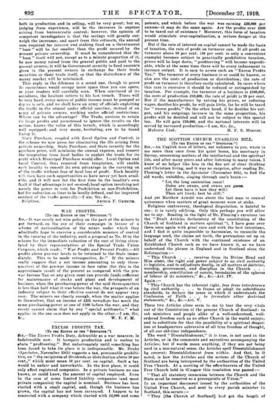WAR PROFITS.
[To THE EDITOR OP THE " SPECTATOR.") 5ie,—It was surely not wise policy on the part of the miners to put forward, on the eve of their campaign in favour of a scheme of nationalization of the mines under which they admittedly hope to exercise a considerable measure of control in the running of the industry, such a proposal as No. 19 in the scheme for the immediate reduction of the cost of living circu- lated by their representatives at the Special Trade Union Congress, which reads : " War Profits and Present Profits.—All profits above pre-war levels to be returned to the State imme- diately. This to be made retrospective, &c." If the miners really suppose that a net income amounting to only three- quarters of the pre-war income in face value (for this is the approximate result of the present as compared with the pre- war Income Tax on any given sum) can provide funds sufficient for maintenance of stocks and plant and development of business, when the purchasing-power of the said three-quarters is less than half what it was before the war, the prospects of an industry subject to their effective control do not appear very rosy. The miners see clearly enough, when the matter applies to themselves, that an income of £225 nowadays has much the tame purchasing-power as one of £100 before the war, and they surely cannot claim that by any " special arithmetic " what applies in the one case does not apply in the other.—I am, Sir,


























 Previous page
Previous page